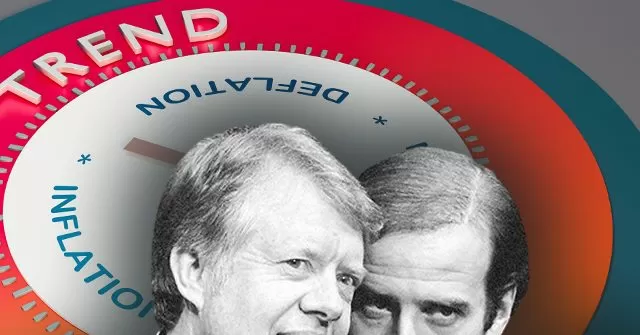President Joe Biden’s third year in office has been marked by a significant decline in his job approval ratings, according to a recent Gallup poll. The poll, released on Thursday, revealed that Biden’s average job approval rating has reached its lowest point since Jimmy Carter was in the White House. This news has caused concern among many Americans, who are wondering what could be causing this decline and what it means for the future of the country.
Biden’s average job approval rating for his third year in office stands at just 43%, a significant drop from his first year in office when he had an average approval rating of 56%. This decline is even more striking when compared to other recent presidents. For example, former President Barack Obama had an average approval rating of 47% in his third year, while former President Donald Trump had an average approval rating of 45%. This puts Biden’s approval rating well below the average for recent presidents and raises questions about his ability to lead the country effectively.
So, what could be causing this decline in Biden’s job approval ratings? One factor could be the ongoing COVID-19 pandemic. While Biden has made significant efforts to combat the virus, including implementing vaccine mandates and providing economic relief to those affected by the pandemic, many Americans are still feeling the effects of the crisis. The recent surge in cases due to the Delta variant has also caused frustration and uncertainty among the public, which could be reflected in Biden’s approval ratings.
Another factor could be the current state of the economy. While the economy has shown signs of recovery since the start of the pandemic, there are still concerns about inflation and rising prices. This has led to criticism of Biden’s economic policies and could be contributing to his declining approval ratings.
However, it’s important to note that Biden’s approval ratings are not solely determined by his actions and policies. The political climate in the country has become increasingly polarized, with many Americans firmly entrenched in their political beliefs. This could be influencing their views of Biden and his performance as president.
Despite these challenges, there are still reasons to be optimistic about Biden’s presidency. He has made significant progress in areas such as infrastructure, climate change, and foreign policy. He has also shown a willingness to work with both Democrats and Republicans to find solutions to the country’s problems. This bipartisan approach is crucial in a time when political divisions are at an all-time high.
Furthermore, Biden’s approval ratings are not the only measure of his success as president. He has faced numerous challenges during his time in office, including the pandemic, economic recovery, and political turmoil. Despite these challenges, he has remained steadfast in his commitment to serving the American people and has made significant strides in addressing the issues facing the country.
It’s also worth noting that approval ratings can fluctuate throughout a president’s term. For example, former President Obama’s approval ratings also saw a decline in his third year in office, but he went on to win re-election in 2012. This shows that approval ratings are not always an accurate predictor of a president’s success or failure.
In conclusion, while President Joe Biden’s average job approval rating has reached its lowest point in his third year in office, there are still reasons to be hopeful about his presidency. The challenges he has faced, including the ongoing pandemic and a polarized political climate, have undoubtedly impacted his approval ratings. However, his commitment to addressing these challenges and his willingness to work with both sides of the aisle should not be overlooked. As we move forward, it’s important to remember that approval ratings are just one aspect of a president’s performance and should not be the sole measure of their success.

